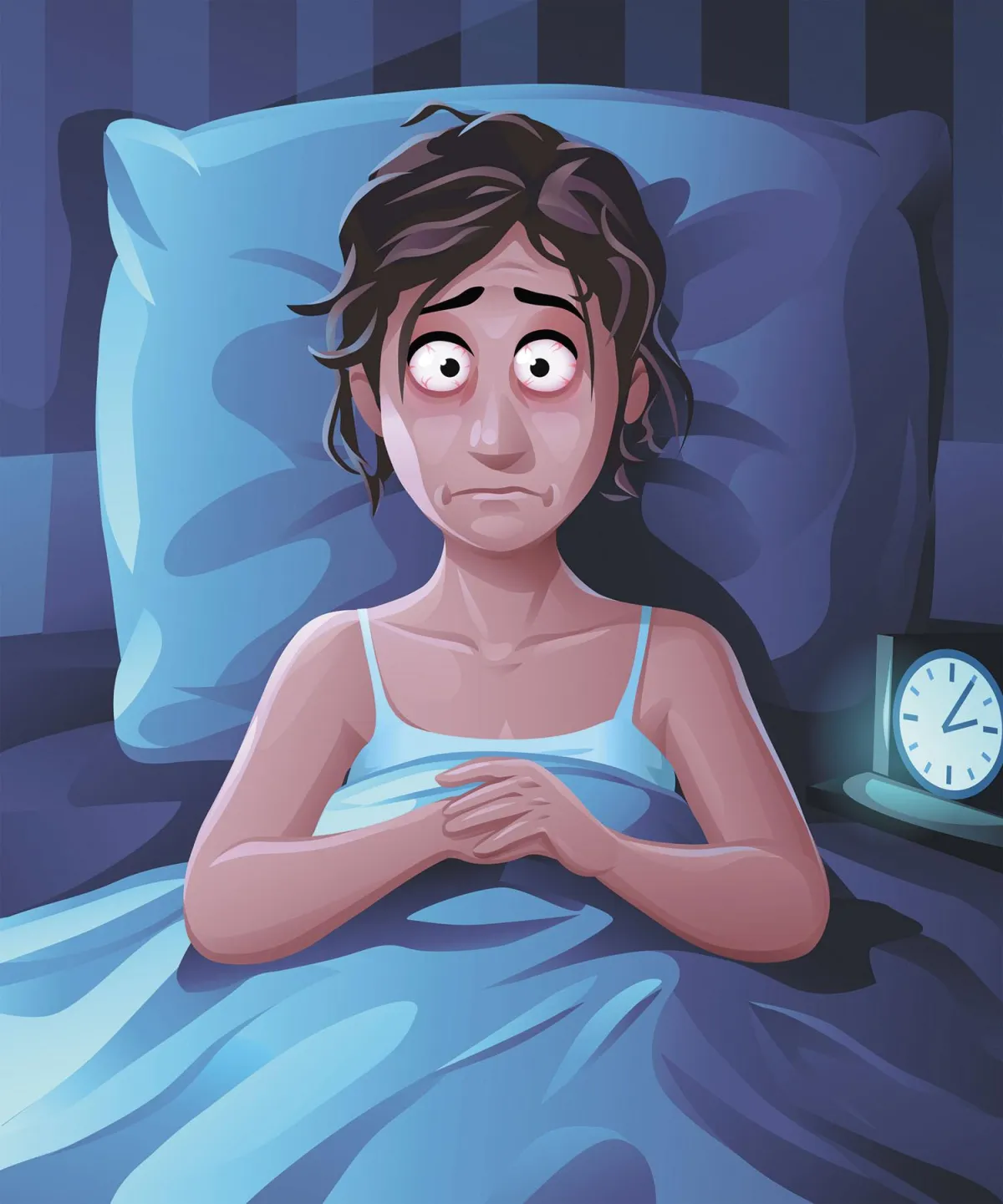INSOMNIA
Insomnia Diagnosis & Treatment at Mir Neurology
What is Insomnia?
Insomnia is a common sleep disorder that affects the ability to fall asleep, stay asleep, or wake up too early. Many people experience poor sleep quality even when they spend enough time in bed. Ongoing sleep problems often lead to daytime fatigue, trouble focusing, and reduced productivity. Insomnia may be short-term or long-term and often relates to stress, lifestyle habits, or changes in sleep routines.
At Mir Neurology, we specialize in diagnosing and treating insomnia with a focus on providing you with the tools and support needed to improve your sleep quality and restore your energy levels.
Symptoms of Insomnia
People with insomnia may experience one or more of the following symptoms:
1. Difficulty Falling Asleep
Taking longer than 30 minutes to fall asleep on most nights, often referred to as sleep onset insomnia. This often involves lying awake with racing thoughts.


2. Nighttime Awakenings
Waking up multiple times during the night, known as sleep maintenance insomnia, with difficulty returning to sleep.
3. Early Morning Awakening
Waking earlier than desired and feeling alert too soon, even when sleep time feels incomplete.
4. Daytime Fatigue and Sleepiness
Feeling tired, sluggish, or experiencing excessive daytime sleepiness that affects work, school, or daily tasks.
5. Focus and Mood Changes
Trouble concentrating, memory lapses, reduced attention span, or increased irritability are linked to poor sleep quality.
6. Poor Sleep Quality
Spending adequate time in bed but waking up feeling unrefreshed, unrested, or mentally foggy.
When sleep problems occur often and affect daily functioning, a professional sleep evaluation can help identify contributing factors.


Causes of Insomnia
Insomnia often develops from multiple influences rather than a single cause. Common contributors to sleep disorders include:
1. Stress and Mental Alertness
High stress levels, mental overactivity, and constant problem-solving can delay sleep onset and disrupt relaxation
2. Emotional and Lifestyle Factors
Busy schedules, work demands, travel, and emotional strain affect the body’s natural sleep rhythm.
3. Physical Discomfort at Night
Discomfort, restlessness, or frequent position changes during sleep may lead to frequent awakenings.
4. Medications
Certain medications, such as stimulants, antidepressants, or corticosteroids, may interfere with sleep as a side effect.
5. Poor Sleep Habits
Inconsistent sleep schedules, excessive caffeine or alcohol consumption, and using electronic devices before bed can all disrupt the natural sleep cycle.
6. Sleep Environment Issues
Noise, excess light, room temperature, or an uncomfortable mattress reduces sleep comfort and sleep efficiency.
7. Hormonal Changes
Hormonal shifts during pregnancy or menopause often impact sleep patterns and sleep continuity.
8. Age-Related Sleep Changes
Sleep becomes lighter and more fragmented with age, increasing the likelihood of chronic insomnia.


Diagnosis of Insomnia
Sleep problems affect everyone differently, which is why an insomnia evaluation requires a personalized approach. At Mir Neurology, your provider reviews your health history, daily routine, and sleep patterns to understand what affects your sleep. The focus is on how sleep habits, schedule, and lifestyle influence sleep quality and nighttime rest.
1. Sleep History & Evaluation
Your provider reviews sleep habits, bedtime routines, wake times, and sleep duration. Questions focus on nighttime awakenings, daytime symptoms, and lifestyle factors that affect the sleep-wake cycle. A sleep diary often helps identify patterns.
2. Physical Exam
A physical exam helps identify factors that may affect overall sleep health and nighttime comfort. This evaluation supports the review of conditions that commonly disrupt sleep quality and rest patterns.
3. Sleep Studies (Polysomnography)
In some cases, overnight sleep studies are used to evaluate sleep cycles, breathing, and movement during sleep. This testing helps assess other sleep disorders that may interfere with restful sleep.
4. Psychological Evaluation
Stress, emotional well-being, and sleep-related behaviors are reviewed when mental or behavioral factors may affect sleep. This step helps identify insomnia triggers linked to mood, stress, or daily habits.
5. Actigraphy
Actigraphy uses a wrist-worn device to track sleep timing, movement, and sleep consistency over several days. This information helps evaluate daily sleep rhythms and sleep pattern irregularities.


Treatment for Insomnia
At Mir Neurology, insomnia treatment focuses on improving sleep quality, nighttime rest, and daytime functioning by addressing factors that disrupt healthy sleep. Care plans are personalized and designed to support patients in Cumberland, Hagerstown, and surrounding Maryland communities.
1. Cognitive Behavioral Therapy for Insomnia (CBT-I)
Cognitive Behavioral Therapy for Insomnia (CBT-I) is an evidence-based approach commonly used for chronic insomnia. This therapy focuses on identifying and changing sleep-related thoughts and behaviors that interfere with rest. CBT-I focuses on:
Improving sleep consistency and bedtime routines.
Reducing habits that disrupt the sleep-wake cycle.
Building confidence in the ability to fall and stay asleep.
2. Sleep Hygiene Education
Sleep hygiene education helps patients build habits that support long-term sleep health. Education focuses on daily routines and nighttime behaviors that influence sleep quality. Key areas include:
Maintaining consistent bedtimes and wake times.
Creating a calm and relaxing bedtime routine.
Reducing caffeine, alcohol, and screen exposure before sleep.
3. Medications
In selected cases, short term sleep medications may be discussed as part of a broader care plan. Providers review sleep symptoms, goals, and daily routines before considering medication options.
Short-term use of sleep aids such as benzodiazepines or non-benzodiazepine sedative-hypnotics can be prescribed to help you fall asleep and stay asleep.
For individuals with insomnia related to anxiety or depression, antidepressants or anti-anxiety medications may also be used to improve sleep quality.
Melatonin supplements may be helpful for resetting the body’s internal clock in cases of insomnia related to circadian rhythm disruption.
4. Relaxation Techniques
Relaxation techniques for sleep help reduce mental and physical tension that interferes with rest. These techniques prepare the body and mind for sleep.
Common techniques include:
Deep breathing exercises.
Progressive muscle relaxation.
Guided relaxation or calming audio exercises.


5. Lifestyle Adjustments
Daily habits play an important role in improving sleep quality and nighttime comfort. Providers help patients make realistic adjustments that fit their schedules. Lifestyle guidance may include:
Regular exercise can help improve sleep quality, but it should be avoided close to bedtime.
Limiting caffeine and alcohol intake, especially in the evening, can help promote better sleep.
Creating a comfortable sleep environment (e.g., keeping the bedroom cool, dark, and quiet) can make it easier to fall asleep.
6. Addressing Underlying Medical Conditions
If your insomnia is linked to a medical condition, such as chronic pain, asthma, or depression, managing the underlying condition is essential for improving sleep. Care may focus on:
Managing physical discomfort that disrupts sleep.
Reducing emotional stress that affects nighttime rest.
Adjusting routines that interfere with sleep consistency.
Living with Insomnia
Insomnia is a manageable sleep condition, and effective care focuses on understanding sleep patterns and addressing the factors that interfere with rest. With a personalized approach, many people experience improved sleep quality, better energy levels, and stronger daytime focus. Consistent care and healthy sleep routines often lead to lasting improvements in both nighttime rest and daily performance.
At Mir Neurology, we provide comprehensive insomnia care designed around each patient’s sleep concerns, lifestyle, and routines. Our team focuses on education, evaluation, and practical treatment strategies to support long-term sleep health and more restorative sleep. Patients receive guidance aimed at improving sleep consistency, reducing nighttime disruptions, and supporting overall well-being.

FAQs
What is the best treatment for insomnia?
The most effective treatment for chronic insomnia is cognitive behavioral therapy for insomnia, also known as CBT I. Treatment plans may also include sleep hygiene education and lifestyle adjustments.
When should I see a doctor for insomnia?
You should see an insomnia doctor if sleep problems occur several nights per week and affect daytime energy, focus, or mood.
Does Mir Neurology treat insomnia in Cumberland and Hagerstown?
Yes. Mir Neurology provides insomnia evaluation and treatment for patients in Cumberland, MD, and Hagerstown, MD.
Are sleep medications the only option for insomnia?
No. Many people improve their sleep without long-term medication by using behavioral therapy, sleep routine changes, and relaxation techniques.
What causes chronic insomnia?
Chronic insomnia often develops due to stress, poor sleep habits, lifestyle factors, or ongoing sleep disruption.
Get Expert Help

If you or a loved one is experiencing memory loss or cognitive decline, early diagnosis is key to effective management. Consult with our neurology specialists for personalized assessment and care plans.
Our Locations
To learn more about our experience or discuss your treatment options, please call us at (301) 797-7600 or schedule a consultation today!
Get our wellness newsletter
Filter out the noise and nurture your inbox with health and wellness advice that’s inclusive and rooted in medical expertise.
Contact Us
Complaint and Queries
(301) 517-7636
About | Careers
© Copyright 2026. Mir Neurology. All Rights Reserved.
A Part of Highland Healthy Living. Powered By CareSyncMarketing



